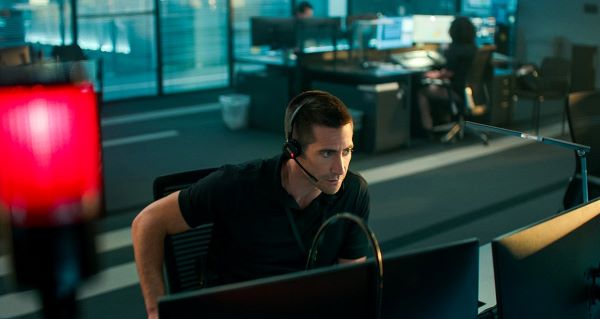
How do you make a film under Covid restrictions? Two movies that had their world premieres at the 2021 Toronto International Film Festival demonstrate how two story lines were shaped by self-isolation, with minimal physical interaction among their casts.
Basically, Lakewood and The Guilty center on solo performances. When characters are on camera, they are near but not too physically close. Both are variations of, you could say, Sorry, Wrong Number, the 1948 Barbara Stanwyck showpiece in which a wealthy invalid, stranded at home, overhears a telephone call of someone plotting a murder—I won’t say who’s. Likewise, the action in these new thrillers happen outside of the camera’s frame. Nevertheless, the protagonists have a direct impact on what happens offscreen. In some ways, the two movies could stand-in for a podcast. (Not surprisingly, Sorry, Wrong Number first started out as a radio play.)
Naomi Watts stars in a modern-day horror story and a parent’s worst nightmare. Director Philip Noyce stated in his video introduction to the TIFF online screening of Lakewood that he made the suspenser to share his fears as a parent—ah, thanks, I guess?
As a single mother who was widowed a year earlier, Amy Carr (Watts in an extremely physical and emotional performance) literally sprints for most of the film’s 84 minutes, with an injured ankle to boot. Amy has taken a personal day from work the Friday before her husband’s memorial celebration; he was killed in an auto accident exactly a year ago. After trying unsuccessfully to rouse her teenage son, Noah, out of bed, she takes to the dirt paths of the surrounding autumnal woods (filmed in Ontario’s photogenic town of North Bay), far from any road or other joggers.
The first half is like a rush of adrenaline. The camera rarely stops moving, barely keeping up with Amy as she hits the trail and makes and receives multiple phone calls—her role as a mother never ends—when she hears news of the police blockading the local high school. At first, she’s alarmed but reassured—her son refused to go to school that morning—until a friend phones and informs her that she noticed there were no vehicles in Amy’s driveway—Noah must have driven himself to school after all. But Amy’s miles away, and her Lyft driver can’t reach her because of the resulting traffic jam. Luckily, she has good Wi-Fi reception, but with each phone call comes more bad news: Noah is still in the school building and a group of students are trapped in a classroom by the shooter.
Watts’s most effective moments are when Amy tries to fight back her tears—though the news is beyond dire. However, after a successfully involving setup, the plot begins to strain credibility: Amy just happens to know a local mechanic who undertakes some on location reporting on her behalf, and she also works for the county’s taxation department and pulls strings to get illegal information, making her position not quite that of the typical parent. Additionally, the film has already made its point about gun violence before its conclusion preaches to the choir.

For The Guilty, Antoine Fuqua remakes, from a conventional perspective, Gustav Möller’s 2018 Danish thriller of the same name, and transplants it to a doom-and-gloom Los Angeles, where the surrounding hills are ablaze. The wide shots of the hazy metropolis are out of a dystopian sci-fi franchise.
The original’s scenario remains the same, although layered with Hollywood histrionics and lacking the original’s cold intensity. Möller’s movie was a slow burner. Fuqua, on the other hand, has turned the heat on full blast almost from the get-go, mostly because of Jake Gyllenhaal’s hot-head performance.
The Americanized scenario announces its theme immediately in the opening credits: “and the truth shall set you free.” Gyllenhaal stars as Joe Baylor, a cop who has been demoted to a 911 dispatcher. He’s under investigation for manslaughter, and he can’t wait to get back on the streets—his court date is the following day. Yet his nonstop rudeness and emotionality call into question his position as any type of problem solver. More than once, the self-righteous Joe offers inappropriate advice to callers: “It’s your own fault, isn’t it?” to a man who may have OD’d and “Don’t drive drunk, asshole” to someone who has had a bicycling accident.
Although his job is to relay information to the California Highway Patrol and the police, Joe takes matters in his own hands after he receives a disturbing call from a distraught Emily (voiced by Riley Keough), pleading for help inside a van while a man’s muffled voiced is heard in the background. Pulling some favors with his policing partner (see a pattern here), Joe finds out that Emily’s ex, Henry (Peter Sarsgaard, offscreen), has a prison record. For nearly an hour, Joe remains alone in one room (though he’s off the clock) trying to save Emily and her two young children from Henry. His motivation to help this endangered family is laid on thick: he stares multiple times at the photo of his own young daughter on his smartphone screen.
Often filmed in an extreme close-up, Joe breaks down and freaks out. The lens’s proximity adds to the claustrophobic mood and the sense that the director has given Gyllenhaal free reign to overact. Every move Joe makes is transparent, and the ending finishes on a far more conclusive and calming note than the more horrific original.
Stick to the 2018 version.
Lakewood arrived at TIFF without a distributor; The Guilty begins streaming on Netflix October 1.
















Leave A Comment